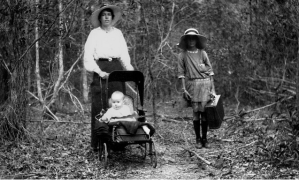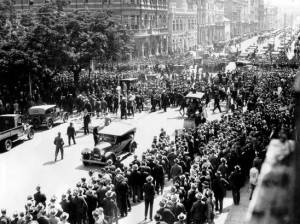The Light at the End of The Tunnel
1 Febuary, 1939
10 years on and Australia has finally reached the light at the end of the tunnel. The Great Depression is often said to have lasted approximately between the years of 1929-1933, but it had a lasting effect upon society, and it is not until this year have we truly felt free of it’s grip, as unemployment rates have dropped to below 10%.
We owe much of our recovery to the AUP government. Although our recovery has been slow, it’s been relatively steady. The Scullin government’s internal disputes and deflationary scheme, were unable to bring relief to Australia from the Great Depression. By the time AUP was voted in in ’32, the economical effects felt by Australia were some of the greatest felt around the world. Under a more conservative government, Australia ties with Britain have been successfully re established.
Although the worst is behind us, we must continue to work together to pick up the pieces, and pray that an economical slump such as this will never be felt again.
Who’s been hit hardest?
30 Novemeber, 1933
The Depression has had huge social impacts upon Australians, but it is impossible to say who has been hit hardest by this time of hardships.
Low income has forced families to take their 13-14 year old children out of schools so they can be sent to work. Jobs are easier to find for young people as their minimum wage is lower, but they are often sacked upon reaching adulthood, leaving them with little future career prospects.
Married women also seek domestic employment such as scrubbing floors, to bring in some extra money to feed the family. And, after working all day, she is still expected to keep up her own domestic tasks, and have the house in order and dinner ready for her husband who is unemployed or involved in a scheme such as ‘The Dole’.
Life for migrants, particularly those from Italy and Southern Europe is as tough as any, as they have little family or friends to call on for help and support during these tough times. They also find themselves being resented for being employed, as they work for less wages.
Even the rich have suffered some of cruel effects of The Depression, with thousands of businesses having failed across the nation since 1929. Some lucky few however, have been hardly effected by the Depression, infact some have even profited from it, taking advantage of weak competitors.
‘The Susso’ & ‘The Dole’
13 June, 1932
“We’re on the susso now,
We can’t afford a cow,
We live in a tent,
We pay no rent,
We’re on the susso now.”
This chant to the tune of ‘We’re in the Army Now’, has become a more frequently sung amongst school children, as unemployment rates continue to rise, peaking this month at 28%.
Over 60,000 people are now dependent upon the sustenance payment provided by the Australian government, know as ‘The Susso’. The Welfare payment is available (upon registration) to those in truly dire situations, and who have been unemployed for a sustained period (over 2 weeks), and possess no assets or savings, and is in the form of rations, however there is talk of an introduction of a cash order system.
‘The Dole’ is an alternative to ‘The Susso’ for those who are unable to find work. The State government employ men to work on public infrastructure such as improving rails and roads and digging canals. The conditions however, are very poor. Those involved in the dole scheme can be sent to remote areas and have their below basic wage payments cancelled if they decline any work.
For those in work, times are not necessarily any easier. 17% of the working population earn less than $4 per week. For most, everyday is a struggle.
Dramatic opening of The Sydney Harbour Bridge
19 March, 1932
The Sydney Harbor Bridge was oficially opened today by NSW Premier Jack Lang, 9 years after construction commenced. New Guard Member, Colonel Francis De Groot, a Dublin-born antique dealer, framatically interviened with the cceremnony, slashing the ribbon with a sword, whilst on horseback. The ribbon was swiftly retied for lang to complete the ceremony.
Although this day marks a triumph for Austtralia the completion of the bridge will put many out of work, as its construction employed 1,000’s.
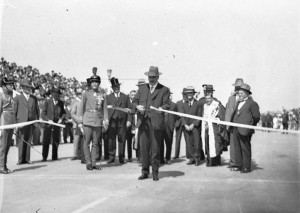
Image source: http://upload.wikimedia.org/wikipedia/commons/9/9f/Sydney_Harbour_Bridge_opening.jpg
New leader brings new hope.
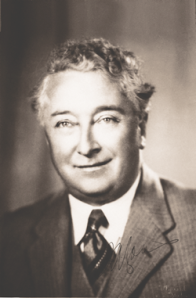
7January, 1932
Former school teacher, Joseph Lyons (United Australia Party) was elected yesterday to replace Labor’s James Scullin, Australia’sfirst CatholicPM. Much confidence on the abilities of the government to effectively address the needs of Australia’s has been lost during The Depression and this shift in power should help regain the faith of Australians in Politics and Government.
Image source: https://moad-electionspeeches.s3.amazonaws.com/uploads/regular_0745fcfc.png
No ‘New Deal’ for Australia
25 September, 1930
The recent visit from Sir Otto Niemeyer from the Bank of England brings further desolate news for struggling Australians. International commodity prices have collapsed, inducing a fall in export earnings and increasing overseas debt. Niemeyer has advised the governments to enforce a deflationary policy. He debated that to make exports more competitive and to raise more profits, wages must be ‘depressed’. He further, and even more significantly demanded that Australia not default on its loan obligations to Britain.
It is estimated that all award wages will be cut by 10%, infrastructure projects will be shelved, and the government will balance their budgets by cutting all overseas borrowing.
Australians won’t be receiving the ‘luxuries’ that come under Roosevelt’s ‘New Deal’, scheme that aims to alleviate the worst effects of the depression by reinvigorating the economy and restoring American faith in Banks and other institutions. I can only hope that this deflationary strategy will achieve it’s desired long term effects before Australians lose faith in the Government completely.
Wall Street Crash!
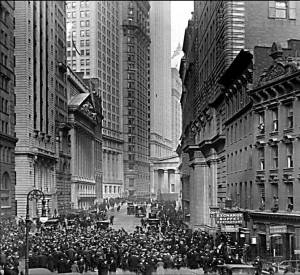
29 October, 1929
The cracks that have been growing slowly in the American Economy simultaneously gave way last night, as The New York Stock Exchange crashed.
As we slept, approximately 16,000,000 shares were sold in The New York Stock Exchange for a fraction of their original price. The value of shares traded fell more overnight than it had grown in the entirety of the previous year. The cause of the crash is unclear, but it appears that the sudden loss of confidence in investors, was symbolic of a number of crises that have been growing throughout the late 20’s.
Our dependance upon exports of primary products and wheat is a major concern. A growing sense of dread spreads across Australia as we fear for the future of our already suffering economy. The future is looking well and truly bleak.
Image source: http://www.edwardnjackson.com/NY_Daily_News/Stock_Market/wall_street_crash.jpg
The circle of strikes.
5 August, 1928
Over the last decade, we have seen an escalation of tension between workers, their employees and the government. After The Great War, Diggers returned to the workforce, but conditions, wages and hours were not modified to accommodate for this increase. The Government have placed emphasis on the development of rural production and farming by focussing their attention upon the conditions of rural workers, leaving urban workers feeling neglected and as if their intersts are being ignored by the Government.
To aid them with getting their interests noticed, urban workers turned to unions, to negotiate their interests with the government. These negotiations have more often than not ended in disappointment, resulting in frequent workers strikes.
Last year marked a milestone in the battle for workers rights, with the formation of Australian Council for Trade Unions. Not long after its formation, the ACTU were successful in reducing the working week to 44 hours for all industries. It was somewhat assumed that the continuous striking would be reduced, if not halted.
This however, has not been the case. The Australian economy is no longer growing, and due to the current recession, Australian businessmen have decided wages are too high, and must be lowered. This move has enraged workers and unionists, as raising wages was another aim the newly created ACTU has been working towards. With a growing unemployment rate, workers have been forced to accept less money for their work. One of the only responses workers can produce is to continue striking, but as we have seen from previous years, the governments response to this action is poor. I anticipate the Government will continue to punish workers for their misfortunes, instead of attempting to end the bleak dispute.
The Roaring 20’s?
3 January, 1927
Have the dramatic social and political changes, and the vast expanse of new inventions caused the twenties to be truly roaring, or have the economical and political hiccups caused it to be more of a yawn? Since the end of The Great War, Australia has experienced some drastic changes in it’s society. Women are not the only ones who have experienced dramatic change, experiencing a new sense of liberty and diminished modesty. Australia itself has experienced a new era of political and economical spontaneity, and new developments.
The value of leisure activities has certainly decreased since pre-war days. Radios, cinemas and dance halls are providing us with expanding options, that were unheard of before The Great War. Are these technological advances positively benefitting Australians, providing us with new ways to relax and socialize? Or are they having negative implications, increasing consumer ability wish cheap luxuries therefore diminishing our work ethic?
By drawing overexcited attention to post war economical potential and success, Politicians have successfully concealing the knowledge that 10% of Australians are currently unemployed. Due to London concern about the rate of Australian public debt, the conservative government, led by Prime Minister Stanley Bruce have decided to set up a Loan Council to control excessive overseas borowwing by the States, will be set up later this year.
Much has occurred during this decade, ad as the new year brings us a year closer to it’s end, I pose the question, are the twenties really roaring? With 3 years left to the end of this decade, only time will tell.
Post war economy
September 2, 1919
Post war economy- It seemed that 4 years of war had a substantial draining effect on the Australian economy. But the governments cancellation of trade agreements with Germany and Austria-Hungary after the signing of the Treaty of Versailles, seems to have done great things for Australian business, providing them with a form of protection that comes from removing competition.
Australian firms in businesses such as steel making and pharmaceuticals have found themselves taking up contracts that were previously occupied by rival German companies. Firms such as BHP and Nicholas have struck sudden fortunes, as contracts from rival overseas companies have been severed. Over 400 products are now being produced in Australia that were produced elsewhere before the war, a win for the Australian economy.
Topics
Archives
